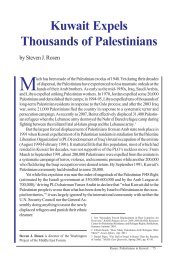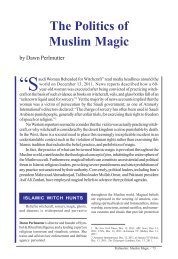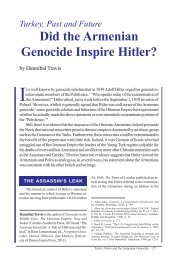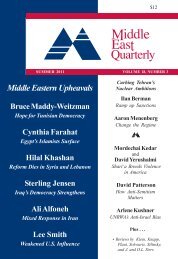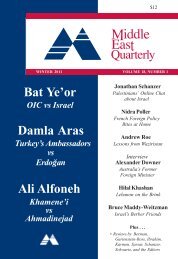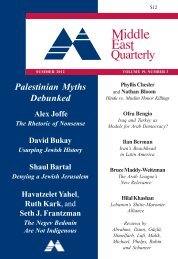Amitai Etzioni David Katz Harsh Pant - Middle East Forum
Amitai Etzioni David Katz Harsh Pant - Middle East Forum
Amitai Etzioni David Katz Harsh Pant - Middle East Forum
- No tags were found...
You also want an ePaper? Increase the reach of your titles
YUMPU automatically turns print PDFs into web optimized ePapers that Google loves.
State and military industriesdominate, and the fate ofmany Egyptians is tieddirectly to the regime.delta and those in <strong>Middle</strong>and Upper Egypt, whichare removed from the political,cultural, and religiouscenters at Memphisor Cairo, were more underdeveloped, impoverished,backward, and traditional in outlook andpractice. Only a few sites, such as Luxor andThebes were patronized by the royalty and laterby the modern Egyptian regimes in the name oftourism. The Bedouins of the Sinai rankled underthe pharaoh’s control and yearned to breakfree and lash out. In all these respects, little haschanged today. The interpretation of nationalismand treatment of the past will likely followthis geography, at least for a while. Everywhere,however, the competing Islamic narrative looms.Egypt at least is an integral unit. One usefulcontrast is with Iraq. Ancient Mesopotamia sawthe land divided into Babylonia in the south andAssyria in the north. These two regions were sociallyand ethnically distinct, but from an earlytime, Mesopotamian kings created a mythologicalvision of unity, which they then used as justificationfor violently attacking and dominatingtheir neighbors. Unity was a fiction but a divineone. The reality consisted of fractious tribes, agriculturalvillages, competing city-states, and violentpolitics. This was no less true for SaddamHussein at-Tikriti than it was for Sargon of Akkad,the “true king,” who rose from cup-bearer to theking of Kish to the king’s killer, and went on tounite Mesopotamia and found a dynasty. Kingsthemselves were the greatest source of disorder.In ancient Egyptian tradition, one of thegreatest roles of the ruler was ma’at, the legitimatemaintenance of order and balance. Ofcourse, minions of the ruler recorded this pretensionfor posterity, but fear of chaos was pervasive,not only for the ruler but the ruled. Invasionsby desert tribes, the annual floods—whichcould bring too much water or not enough, orbring it too early or too late in the growing season—andfamine, hunger, and violence were alltoo real. The reward of living in a rich ecosystemis plenty with the caveat that nature is fickle. Akind of national awareness emerged in ancientEgypt, at least with respect to xenophobia towardforeigners, in partthrough fear of chaos. Thefact that the kings of Egyptwere depicted literally asgods who held heaven andearth together was another metaphysical dimensionof the ancient Egyptian “nation,” alwaysbacked up by military force. Piety vied with povertyand with fear. But then as now, the statewas the provider. Most ancient Egyptians werebound to various royal or temple establishments.Despite any liberalization undertaken byMubarak, state and military industries continueto dominate the Egyptian economy. The fate ofmany Egyptians was and is tied directly to theregime.UNCERTAIN FUTUREDATELINEA similar sort of chaos is playing out in Egypttoday. Price subsidies for food and fuel accountfor 7 percent of the state’s budget, and more than40 percent of Egypt’s food is imported. 8 Food inflationreached 17 percent in December 2010, 9 andhundreds of thousands of university graduatesare unable to find jobs. 10 Chaos thus has manysources—an educated population shut out fromprosperity and an underclass on the verge of hunger.Antiquities—identified now with the Mubarakregime and a potential source of revenue for impoverishedEgyptians—have suffered from timeimmemorial. The upper and middle class Egyptianswho locked arms to protect the Cairo Museumfrom the initial bout of looting are too fewand spread too thin to defend even a fraction ofEgypt’s museums and monuments. But the riotingthat has unfolded, perhaps with the regime’scontrivance, has given Egyptians a clear pictureof chaos. Egypt’s prisons have been emptied ofcriminals, terrorists, and political prisoners, and8 Al-Masry al-Youm (Cairo), June 8, 2010.9 The Egyptian Gazette (Cairo), Jan. 18, 2011.10 “Youth Unemployment, Existing Policies and Way Forward:Evidence from Egypt and Tunisia,” The World Bank,Washington, D.C., Apr. 2008.Joffe: Egypt’s Antiquities / 77




